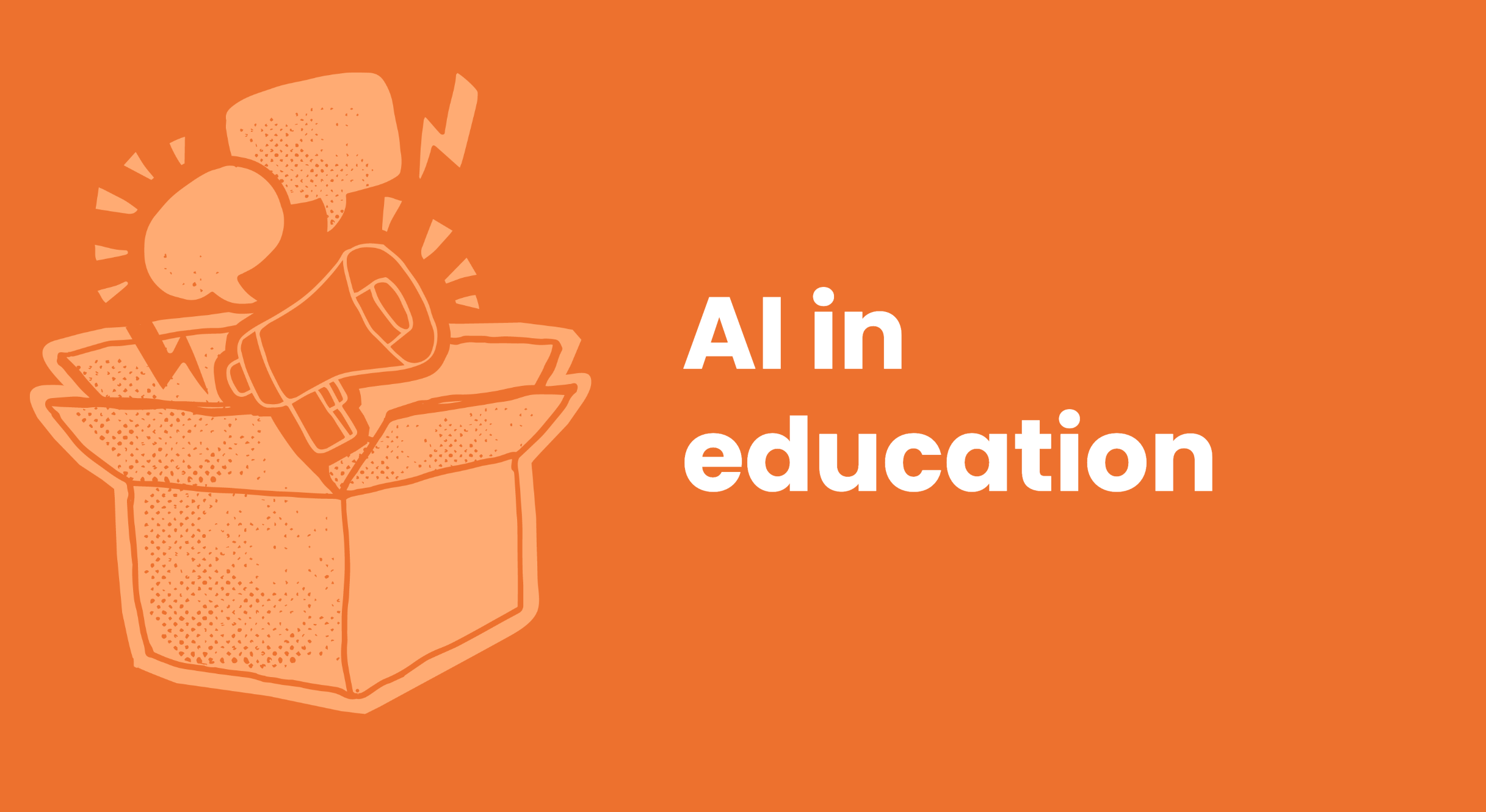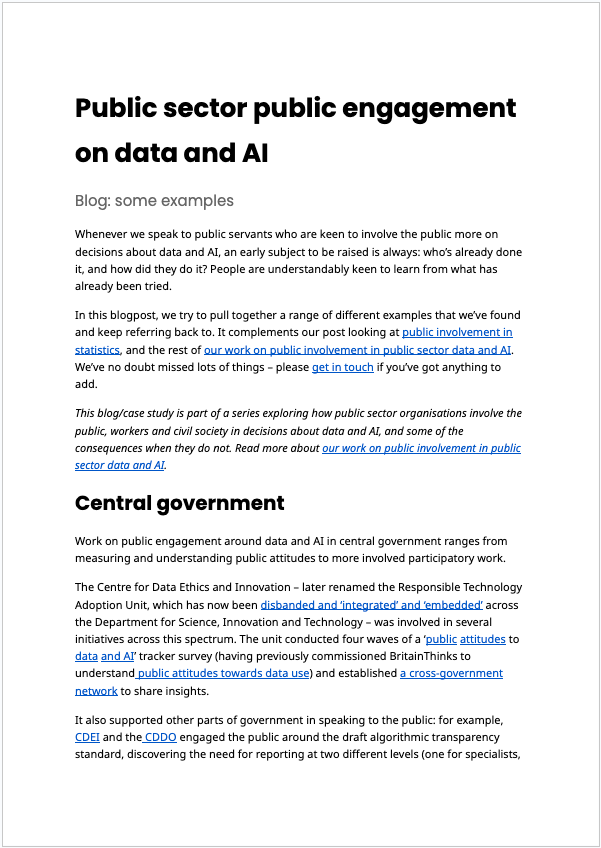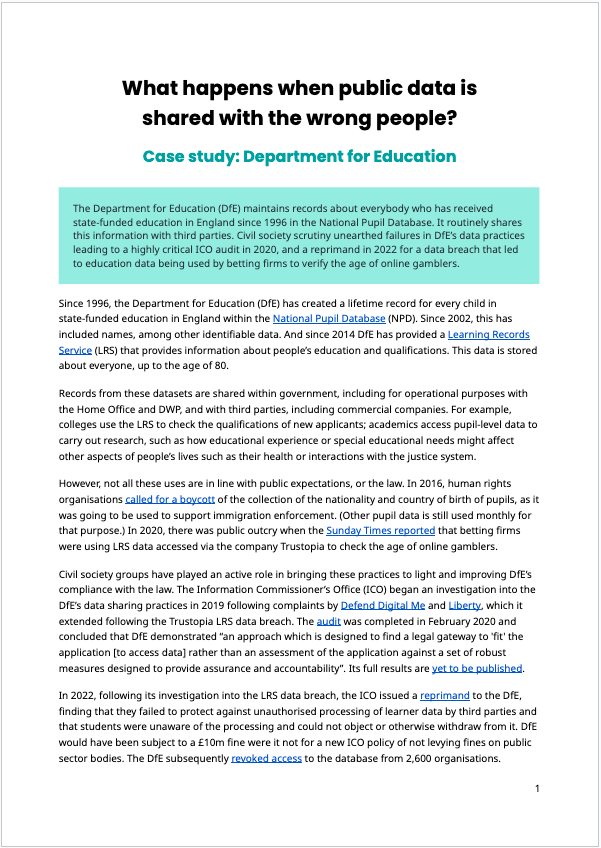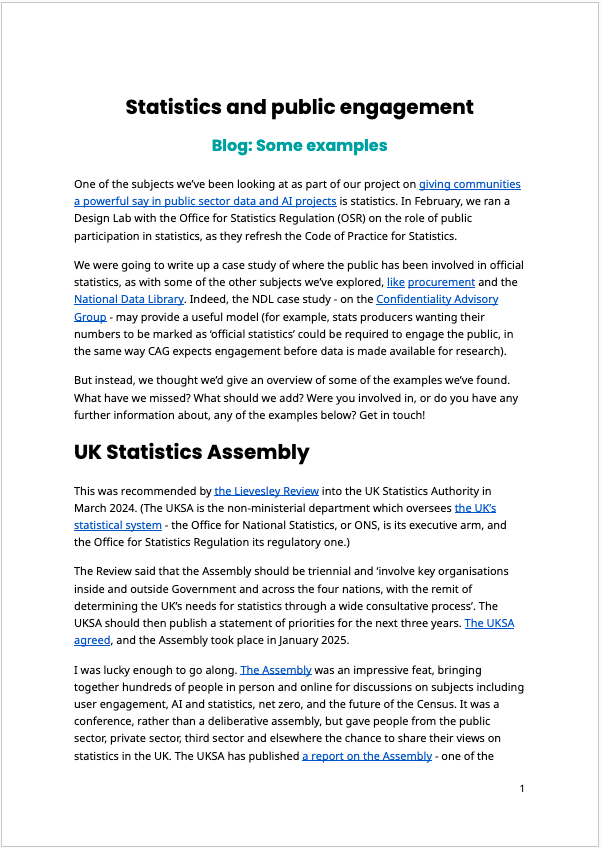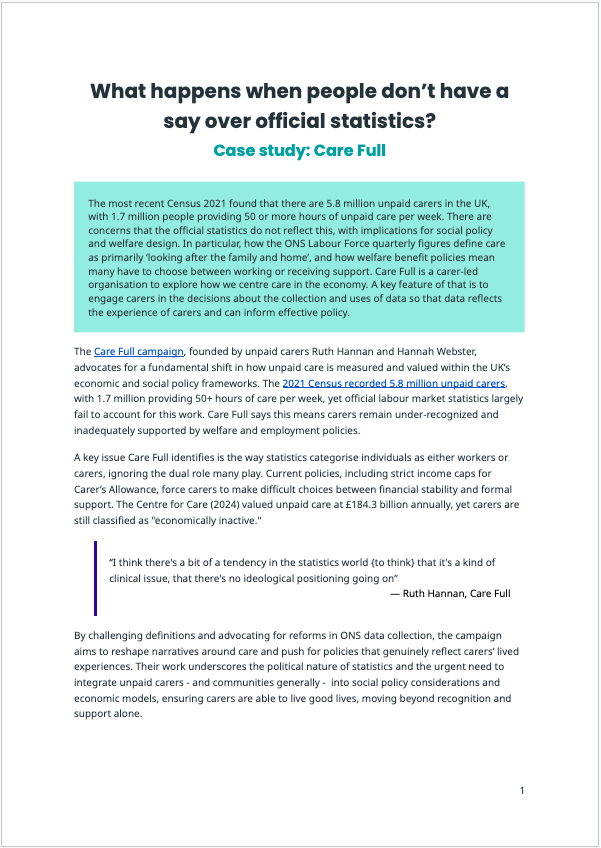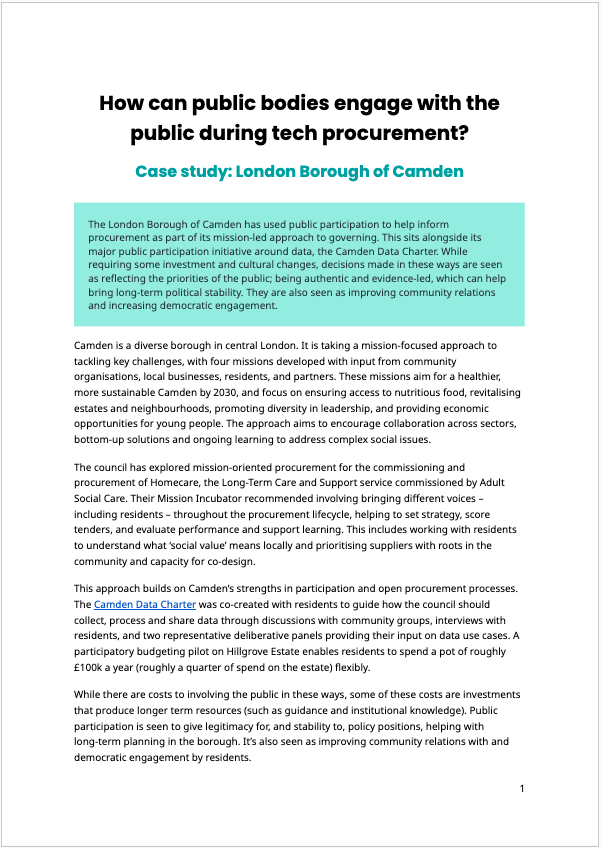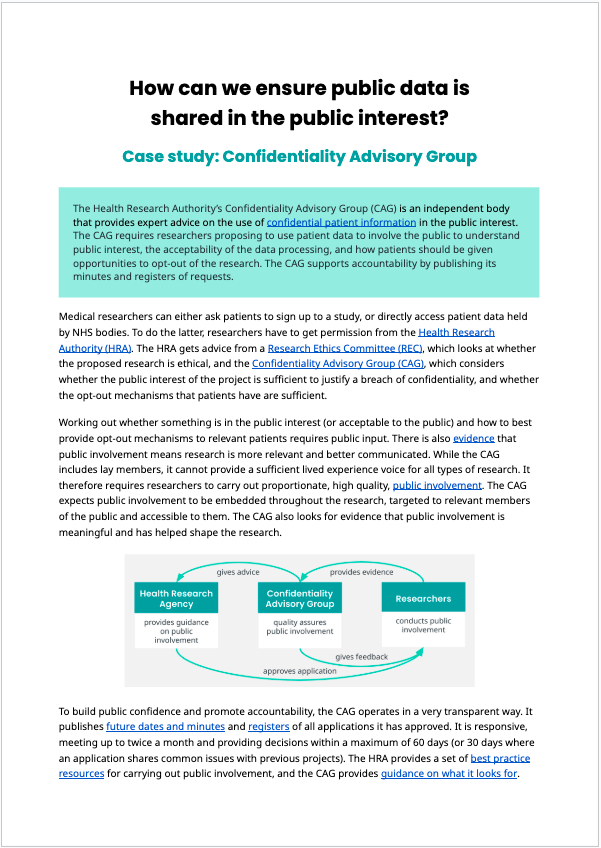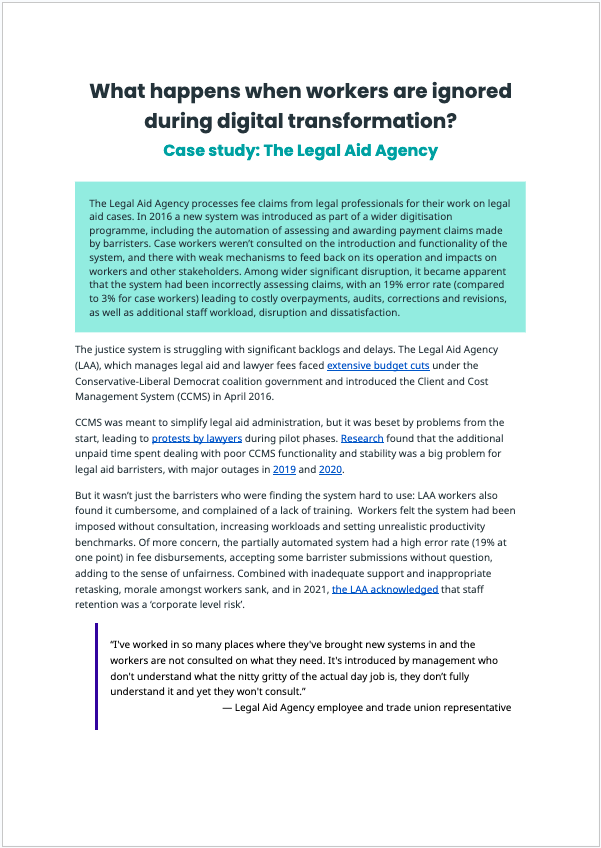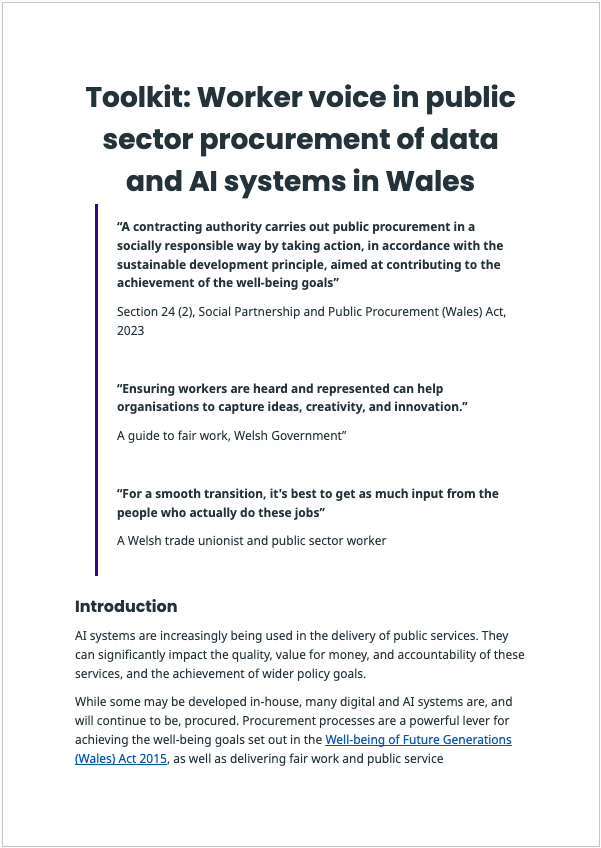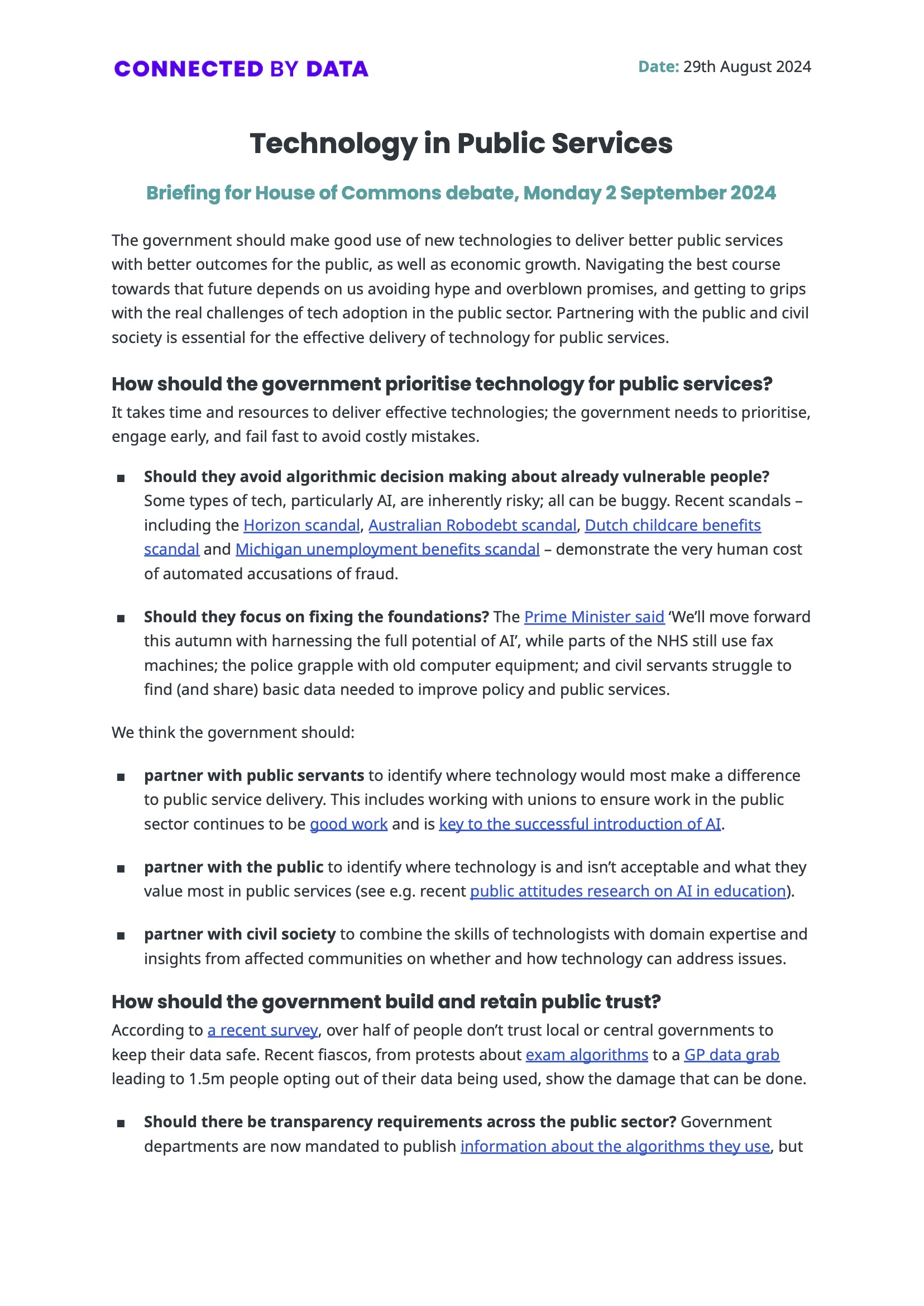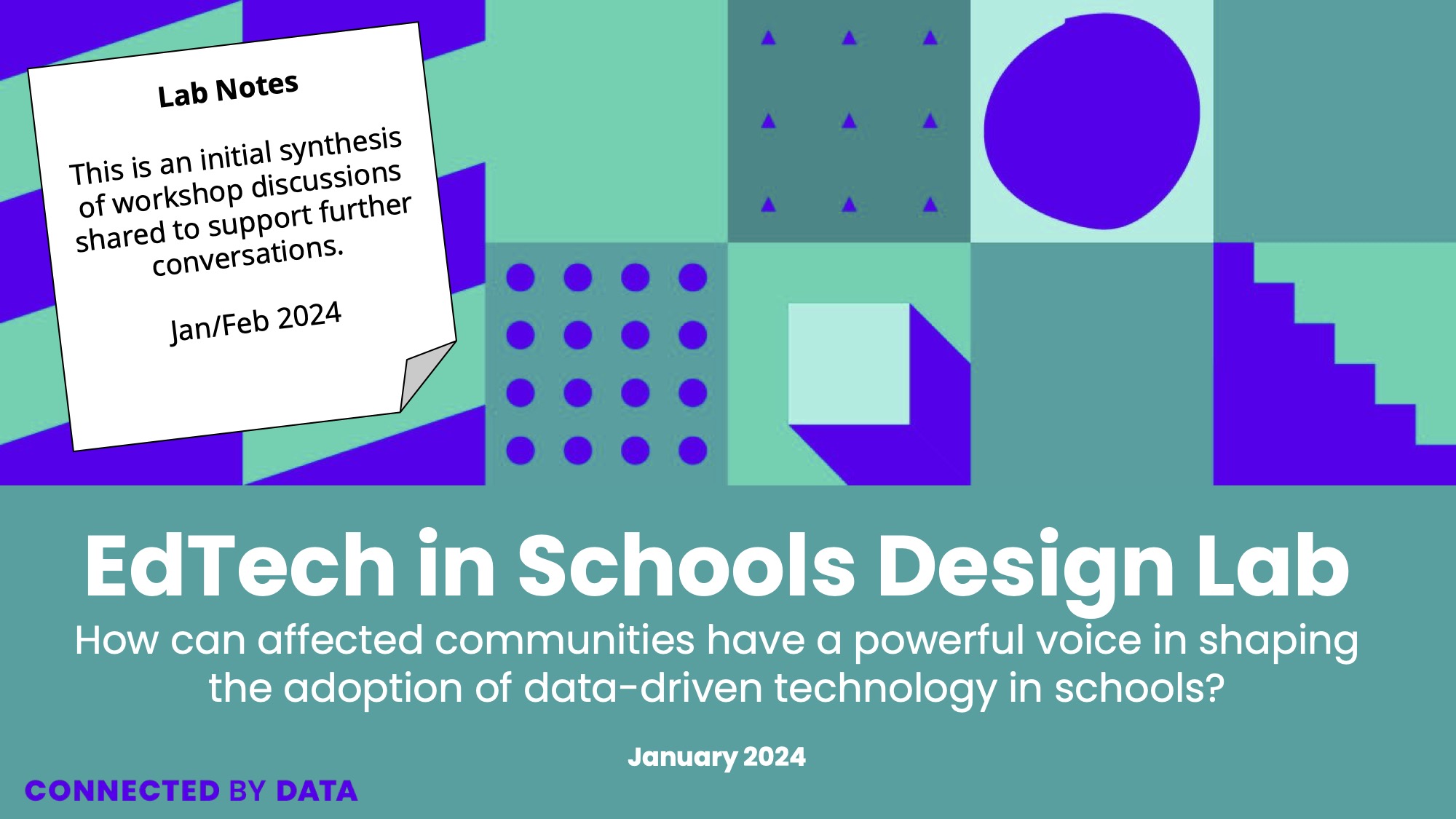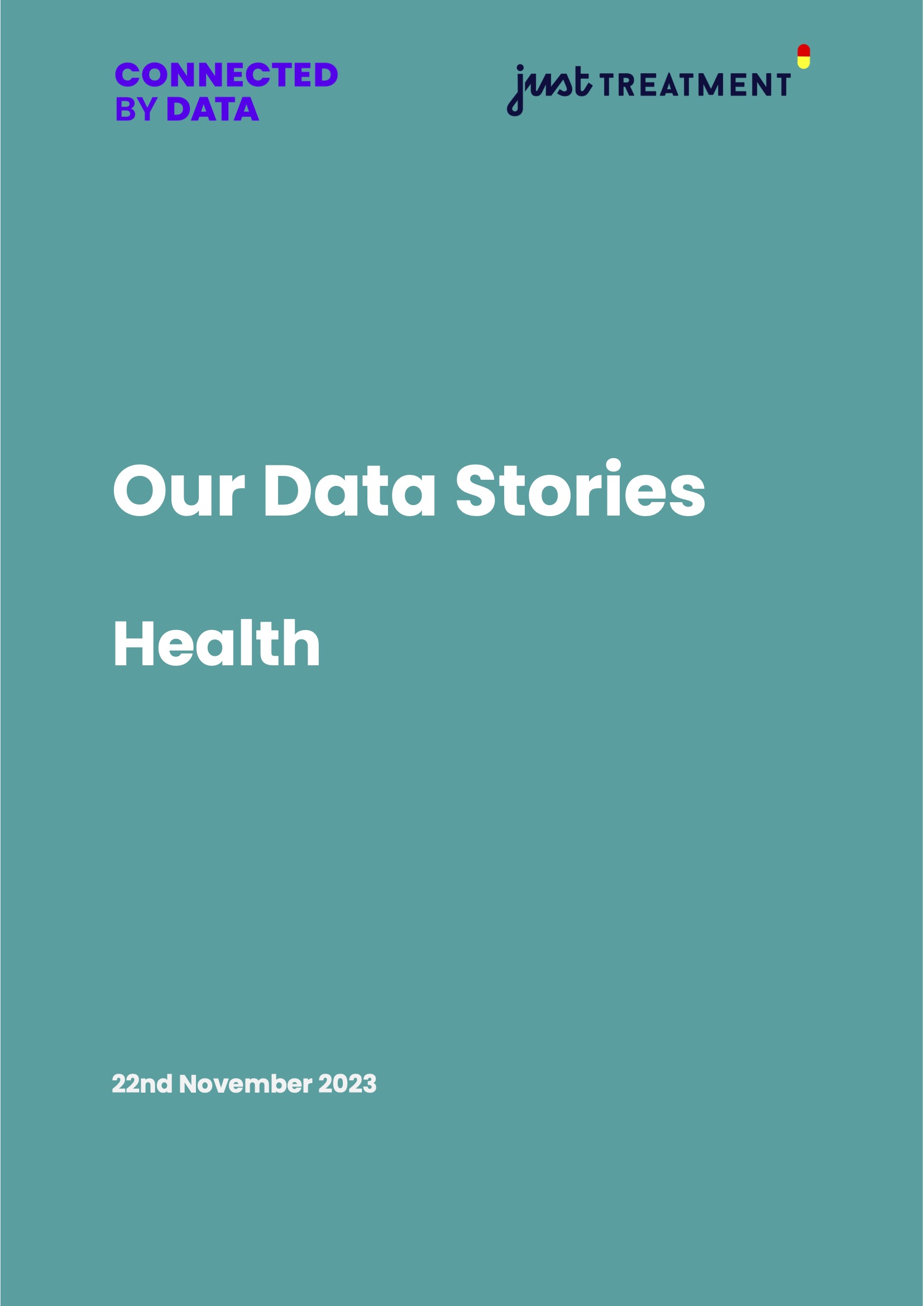Public sector
Giving citizens and public sector workers a powerful say


The UK Government is turning to AI to help improve public services and reduce costs. These initiatives are being felt across the public sector: in health, education, and the justice system; in local government, central government and devolved administrations.
The public sector holds some of our most sensitive data – including about our health, income and benefits – as well as making decisions that can have huge impacts on our lives, both individually and as a society. With so much at stake, there is a democratic imperative to ensure that the public has a powerful say in how the government adopts data and AI.
We are working across the public sector with organisations and individuals who are exploring new ways of engaging the public in these decisions, as well as with the civil society organisations seeking to build transparency and accountability into the way the government adopts technology.
Between 1st November and 15th December 2025, over 1000 students shared their views through a distributed dialogue on how schools, government and AI firms should be approaching the use of generative AI in education.
A joint statement made by 10 unions representing education workers, produced as part of the Connected by Data and TUC project ‘Building educator’s power to shape AI‘
We are ten unions representing millions of educators across the UK – teachers, specialists, support staff, school leaders, and workers throughout the education system. Every day we support, teach and lead in schools, colleges, and universities across all jurisdictions of the UK.
As AI is being rolled out rapidly in education, there is an urgent need to ensure this is shaped by the expertise and professional judgement of these educators. We recognise that AI and education technology (EdTech) can complement human-centred education. But we know that AI cannot solve the education system’s deeper problems: underfunding, teacher shortages, overwhelming workloads, or the social and economic pressures educators face every day. And without clear guardrails, these technologies risk making existing problems worse and undermining both quality of education and students’ best interests.
To realise the potential that AI in education can offer, educators and their unions must be central to every stage of AI adoption, from policy formation and design, through procurement and deployment, to evaluation. All actors and institutions must ensure that AI and EdTech strengthens, not replaces or undermines, the vital relationships between all education workers and students.
We set out here the ways in which educator voice must be empowered from end to end, from the highest levels of regulation to decisions at local levels.
The ‘Generative AI in Education: Have your Say’ Workshop in a Box provides adaptable resources for holding discussions with students aged 10 - 18 on benefits and problems of AI in education, supporting deliberation on the issues it raises, and suggesting a range of ways to express feedback.
Between November 3rd and December 15th 2025 a feedback platform is available to submit the outcomes of workshop sessions as an input to the DfE AI in Education Summit taking place in early 2026.
Whenever we speak to public servants who are keen to involve the public more on decisions about data and AI, an early subject to be raised is always: who’s already done it, and how did they do it? People are understandably keen to learn from what has already been tried.
This blog/case study is part of a series exploring how public sector organisations involve the public, workers and civil society in decisions about data and AI, and some of the consequences when they do not. Read more about our work on public involvement in public sector data and AI.
The Department for Education (DfE) maintains records about everybody who has received state-funded education in England since 1996 in the National Pupil Database. It routinely shares this information with third parties. Civil society scrutiny unearthed failures in DfE’s data practices leading to a highly critical ICO audit in 2020, and a reprimand in 2022 for a data breach that led to education data being used by betting firms to verify the age of online gamblers.
This case study is part of a series exploring how public sector organisations involve the public, workers and civil society in decisions about data and AI, and some of the consequences when they do not. Read more about our work on public involvement in public sector data and AI.
One of the subjects we’ve been looking at as part of our project on giving communities a powerful say in public sector data and AI projects is statistics. In February, we ran a Design Lab with the Office for Statistics Regulation (OSR) on the role of public participation in statistics, as they refresh the Code of Practice for Statistics.
This blog/case study is part of a series exploring how public sector organisations involve the public, workers and civil society in decisions about data and AI, and some of the consequences when they do not. Read more about our work on public involvement in public sector data and AI.
The most recent Census 2021 found that there are 5.8 million unpaid carers in the UK, with 1.7 million people providing 50 or more hours of unpaid care per week. There are concerns that the official statistics do not reflect this, with implications for social policy and welfare design. In particular, how the ONS Labour Force quarterly figures define care as primarily ‘looking after the family and home’, and how welfare benefit policies mean many have to choose between working or receiving support. Care Full is a carer-led organisation to explore how we centre care in the economy. A key feature of that is to engage carers in the decisions about the collection and uses of data so that data reflects the experience of carers and can inform effective policy.
This case study is part of a series exploring how public sector organisations involve the public, workers and civil society in decisions about data and AI, and some of the consequences when they do not. Read more about our work on public involvement in public sector data and AI.
The London Borough of Camden has used public participation to help inform procurement as part of its mission-led approach to governing. This sits alongside its major public participation initiative around data, the Camden Data Charter. While requiring some investment and cultural changes, decisions made in these ways are seen as reflecting the priorities of the public; being authentic and evidence-led, which can help bring long-term political stability. They are also seen as improving community relations and increasing democratic engagement.
This case study is part of a series exploring how public sector organisations involve the public, workers and civil society in decisions about data and AI, and some of the consequences when they do not. Read more about our work on public involvement in public sector data and AI.
The Health Research Authority’s Confidentiality Advisory Group (CAG) is an independent body that provides expert advice on the use of confidential patient information in the public interest. The CAG requires researchers proposing to use patient data to involve the public to understand public interest, the acceptability of the data processing, and how patients should be given opportunities to opt-out of the research. The CAG supports accountability by publishing its minutes and registers of requests.
This case study is part of a series exploring how public sector organisations involve the public, workers and civil society in decisions about data and AI, and some of the consequences when they do not. Read more about our work on public involvement in public sector data and AI.
The Legal Aid Agency processes fee claims from legal professionals for their work on legal aid cases. In 2016 a new system was introduced as part of a wider digitisation programme, including the automation of assessing and awarding payment claims made by barristers. Case workers weren’t consulted on the introduction and functionality of the system, and there with weak mechanisms to feed back on its operation and impacts on workers and other stakeholders. Among wider significant disruption, it became apparent that the system had been incorrectly assessing claims, with an 19% error rate (compared to 3% for case workers) leading to costly overpayments, audits, corrections and revisions, as well as additional staff workload, disruption and dissatisfaction.
This case study is part of a series exploring how public sector organisations involve the public, workers and civil society in decisions about data and AI, and some of the consequences when they do not. Read more about our work on public involvement in public sector data and AI.
AI systems are increasingly being used in the delivery of public services. They can significantly impact the quality, value for money, and accountability of these services, and the achievement of wider policy goals.
While some may be developed in-house, many digital and AI systems are, and will continue to be, procured. Procurement processes are a powerful lever for achieving the well-being goals set out in the Well-being of Future Generations (Wales) Act 2015, as well as delivering fair work and public service improvements. The Social Partnership and Public Procurement (Wales) Act 2023 (SPPPA) sets out the legal framework that public bodies in Wales must follow to achieve well-being outcomes through procurement.
This toolkit provides an actionable framework for empowering worker voice throughout the procurement process. It is targeted at public sector commissioners, procurement professionals and trade union representatives seeking to apply social partnership and responsible procurement practices to digital and AI systems. Suppliers to the public sector may also find this toolkit useful.
🏴 A Welsh language version of the toolkit is also available.
📄 A PDF version is available for download in English and Welsh (12 pages, PDF).
The toolkit is produced by Connected by Data in collaboration with the Trades Union Congress Cymru, with input from diverse stakeholders in trade unions and the public sector in Wales.
The government should make good use of new technologies to deliver better public services with better outcomes for the public, as well as economic growth. Navigating the best course towards that future depends on us avoiding hype and overblown promises, and getting to grips with the real challenges of tech adoption in the public sector. Partnering with the public and civil society is essential for the effective delivery of technology for public services.
This briefing was circulated to relevant MPs prior to the Commons General Debate on Technology in Public Services, held on 2nd September 2024.
How can affected communities have a powerful voice in shaping the adoption of data-driven technology in schools?
We brought together 17 participants for two online workshop sessions in January 2024 to explore:
- the growing use of data-driven educational technologies (EdTech) in UK schools;
- challenges around who has, and who does not, have a say in EdTech adoption;
- possible approaches to give affected communities a more powerful voice in EdTech decision making.
Participants included teachers and school counselors, teaching union representatives, and education researchers. Sessions were designed with support from Defend Digital Me.
This is an initial synthesis of workshop discussions shared to support further conversations.
Our lives have become digitised. Data about who we are, what we do and the environment we live and work in is collected about us constantly, whether we realise it or not. Whoever controls that data, be that big corporations or governments, has incredible power.
Yet, amid the hype and worry about the data-driven transformation of our world, there is often something conspicuously missing: personal stories. They ground our understanding that this change is not a remote future, but is a reality in progress that is affecting every relationship and interaction we have, as workers, family members, consumers and as citizens.
By hearing the voices of individuals we can better see the impacts of a datafied society. How we are affected is dependent on our individual circumstances, but the power of data is on a societal level. Whether at school, at work or in the justice system, there is a need to bring in this collective voice.
Through these stories, we aim to not only illustrate the reality of the impact of data on our lives, but to point the way towards a different approach, including:
- a focus on the wider impact of the collection and use of data
- rights for all those affected by data-driven decisions
- processes of participation for the public to help shape a datafied society
Our first data stories report focused on people at work. This report, written with Just Treatment, focuses on how people experience data when interacting with health services.
Along with creative agency Brickwall, Connected by Data carried out a research and development project for the Local Government Association (LGA) to inform the development of a series of explainer videos on how local government engagement with Artificial Intelligence (AI).
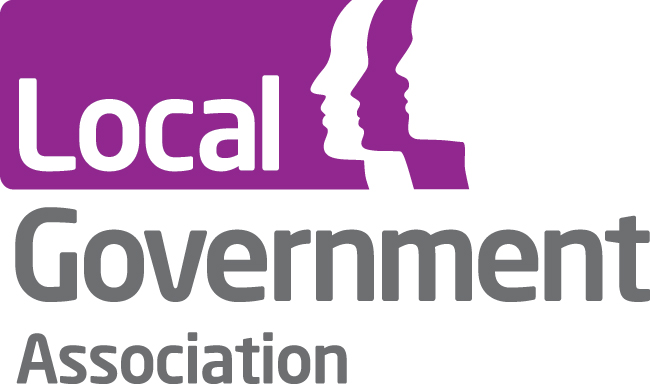

As part of our project on ‘Giving communities a powerful say in public sector data and AI projects’, we’re interested in supporting practitioners – particularly in the public sector – who are engaging the public on data and AI. To that end, we convene up a community of practice.
Communities are affected daily in both positive and negative ways by data governance decisions made by local and national governments. These arise through interactions with public services such as health and care; schooling; policing and justice; tax and benefits, as well as in more pervasive ways through government’s collection and dissemination of data, statistics and evidence to inform policymaking.


We are working with DfE to develop a creative engagement toolkit to support participatory sessions with children and young people (ages 10–18) in schools, colleges, youth groups, and community settings. The toolkit will help facilitators gather youth perspectives on generative AI in education, with a focus on what they want technology companies to consider.
The official push to roll out AI in education (among every other area…) throws up sticky questions of pedagogy, practicality and professionalism. Yet too often the voices of educators – support staff, teachers, school leaders and specialists – are squeezed out by the promises of Edtech products offering to solve everything from attainment to attendance.
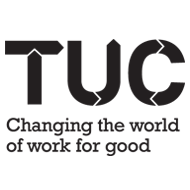

Artificial intelligence (AI) and digital technologies are rapidly evolving and complex issues that have wide-ranging implications across sectors and workplaces. While there are overarching concerns, union and policy responses are more effective when tailored to reflect the specific contexts of different industries, technology applications, impact on workers, regulatory regimes and ethical concerns.
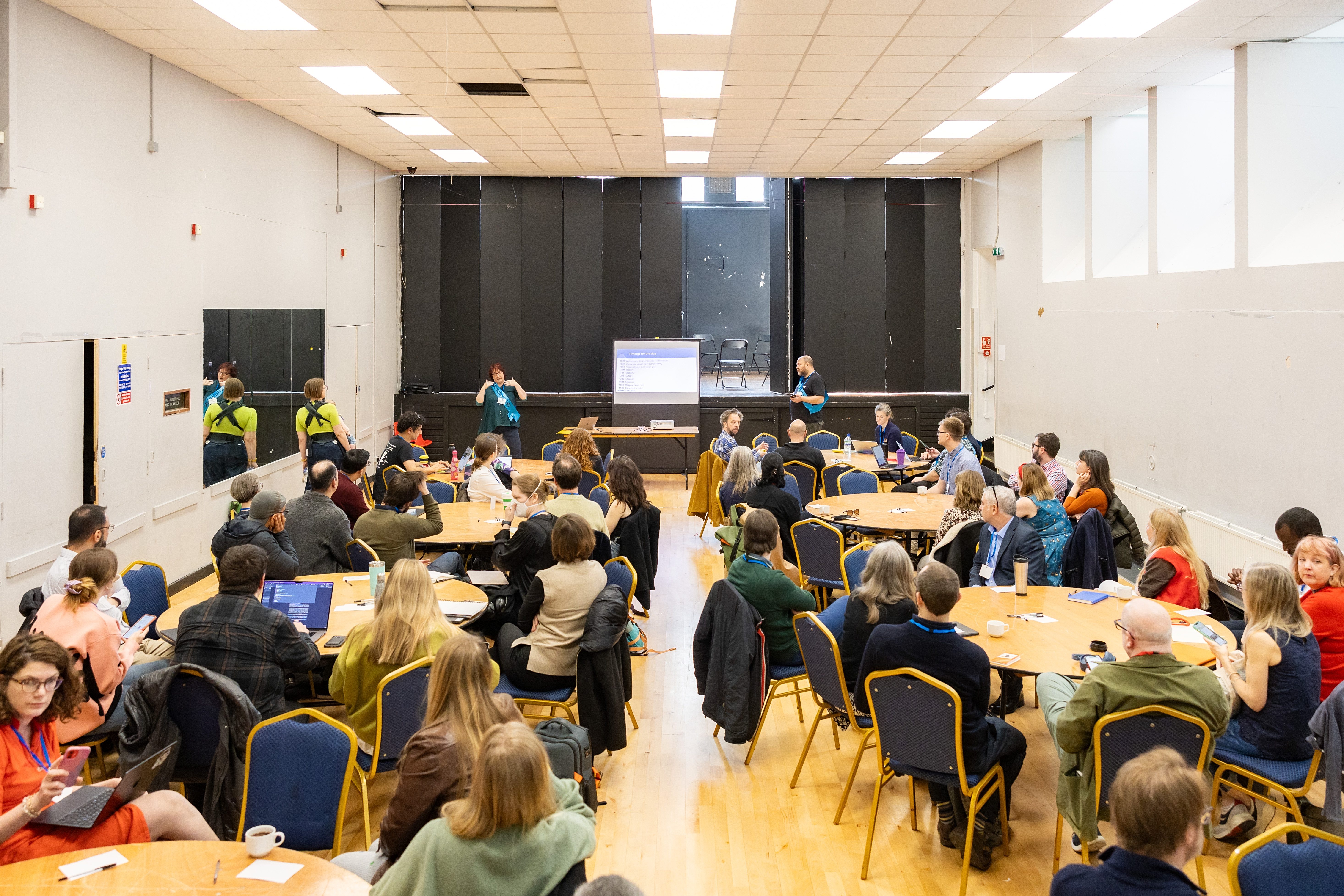
This conference is for anyone interested in how to achieve better outcomes in the delivery of digital, data and AI work in the public sector through the involvement of the public, communities and workers. Come if you’re a public servant trying to engage or involve the public in your work on technology. Come if you’re working in civil society, in the union movement, or with grassroots groups, trying to be heard. Come to share what you’re up to, and to learn from others; leave with new insights, ideas, and connections.

Tim attended the presentation of the “Our Schoolwork, Our Say” Legislative Theatre performance with young people sharing ideas around the governance of education data.

How can schools consult with parents, pupils and teachers on school-level policies on AI in ways that help them to advance their rights, learn to think critically about technology and its capability so that they adopt it in ways that are beneficial, and exercise their democratic muscles?

The Blueprint for Modern Digital Government commits to providing “clear and actionable guidance to embed best practices in trust and responsibility” and cites Camden Council’s data charter, co-created with citizens, as an example of how public bodies can maintain public trust and confidence. It says that civil society groups will be “invited to co-design services in partnership with communities and public sector workers to ensure they are responsive to their needs.”
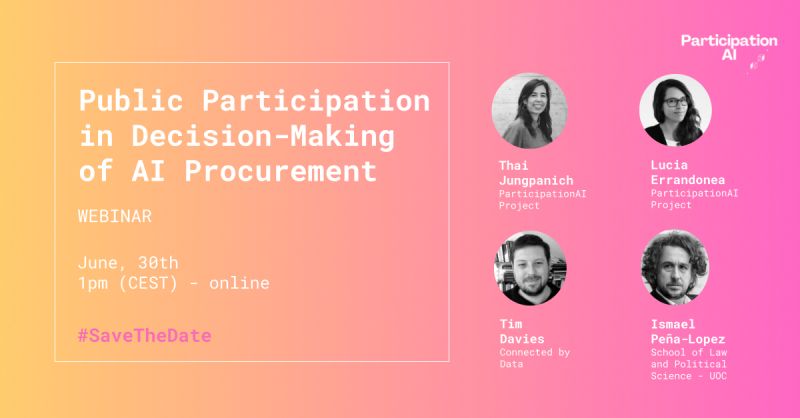
As governments increasingly use AI to deliver public services, key decisions—especially around procurement—often happen behind closed doors, without input from the communities most affected.


Local government is at the front-line in piloting and deploying new AI and data-driven tools in the search for savings and service improvement. How can and should local governments engage with local residents when planning, evaluating and governing data and AI-enabled reforms? And what are the challenges and opportunities of involving the public in decision-making on data and AI uses?

On 12 June Jeni Tennison, our Founder and Executive Director, will be the keynote at the UK Census User Conference. She will speak on the importance of user and public voice in official statistics.
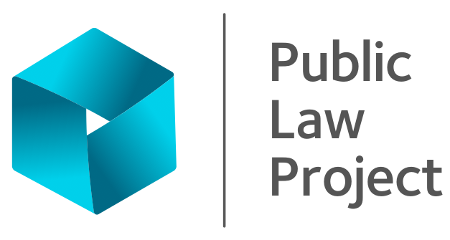
Is the law keeping pace with technology to protect people’s rights and uphold transparency and accountability standards? How can public, regulatory and human rights law help ensure technologies are deployed for the benefit of society? The Public Law and Technology Conference seeks to consider these questions.
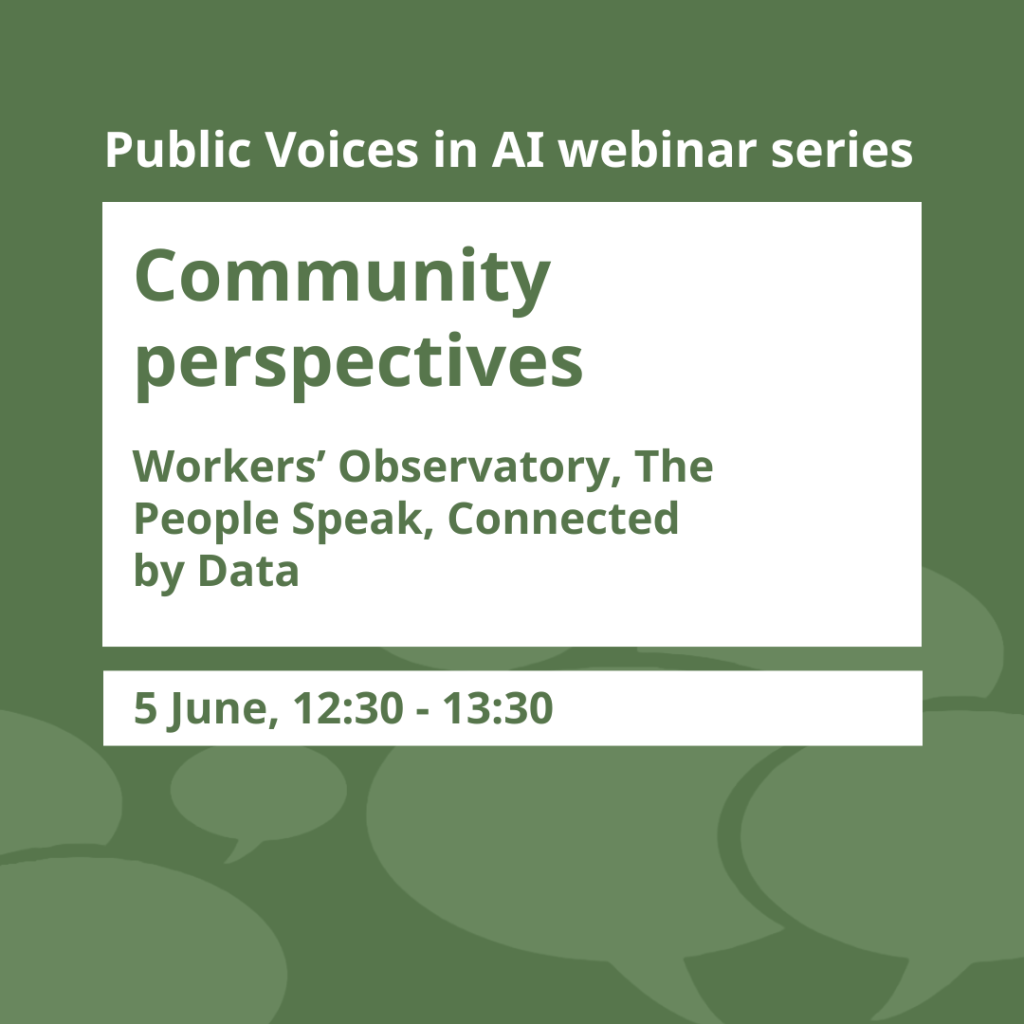
Tim Davies, Anna Beckett and members of the Public Voices in AI People’s Advisory Panel, spoke at the ESRC Digital Good Network’s webinar series with the Public Voices in AI project about how public voices can be put front and centre in artificial intelligence research, development and policy.

In May 2025 National Voices and Connected by Data hosted a 90 minute roundtable under the heading ‘aligning AI innovation in healthcare with patient need and the future NHS’.
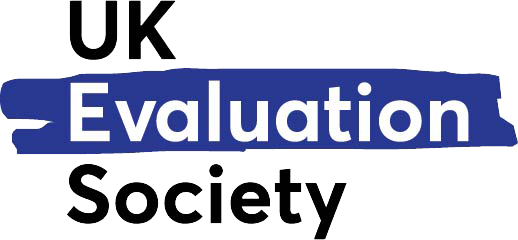
On 19 May Jeni Tennison, our Founder and Executive Director, will be the keynote at UK Evaluation Society’s ‘Evaluation Conference’ 2025’ event.
She will be speaking on “Involving communities in evaluating public sector AI”.

In contrast to the halting approach to reform from the current UK government, Donald Trump and Elon Musk have moved fast to slash staff and programmes. That has led some of those frustrated with the slow pace of government reform in the UK and elsewhere to see DOGE as a model for radical reformers.

Do With is not a new organisation or formal campaign. Instead, it hopes to be a grassroots movement for change led by the people who are part of it. As such, this event on 26 March will be a space for attendees to share ideas on how they would like to deliver change and to connect people together who want to work on specific ideas. Those ideas could operate within public sector teams and organisations or within communities or both; and could operate at local, regional or national level.

The Procurement Act is about much more than new legislation – it’s an opportunity to re-imagine how buyers and suppliers can work together to deliver outstanding public services. The biggest set of regulatory changes in a generation will create new opportunities – but also challenges as the entire supply chain adjusts to this new landscape.

On 25 February Jeni Tennison, our Founder and Executive Director, will be the keynote at TPXimpact’s ‘Power of Data’ event in London, Convening the UK’s top data leaders and policymakers to shape the future of government data strategy.

The Office for Statistics Regulation (OSR) is currently running a consultation on a refresh of the Code of Practice for Statistics (the Code) to ensure it continues to meet the needs of its wide and evolving audience. The Code sets the standards that producers of official statistics should commit to. Compliance with the Code gives people confidence that published government statistics have public value, are high quality, and are produced by people and organisations that are trustworthy.

The Labour Government has a manifesto commitment to build a National Data Library (NDL) “to bring together existing research programmes and help deliver data-driven public services, whilst maintaining strong safeguards and ensuring all of the public benefit”. This commitment is in the context of a drive for greater AI innovation and adoption across the economy.


Digitalisation within the public sector continues at pace. UK Labour is strongly signalling a technology-driven strategy for wide ranging public services reform and a significant role for private sector vendors.
In order to shape public sector digitalisation towards fair and equitable outcomes for workers and communities alike, a range of voices and perspectives need to be meaningfully incorporated at all stages.
Civil servants are already using AI for a variety of purposes, from summarising and analysing data to drafting correspondence. The new Labour government sees AI as a route to greater productivity and growth, both within government and better public services.
Bringing together the themes of two private roundtables hosted by the Institute for Government in partnership with Scott Logic, this public event explored the use of AI in policy and communications, and for civil service effectiveness.

On Thursday 18 July 2024, on Zoom, we held the first meeting of a community of practice as part of our project on Giving communities a powerful say in public sector data and AI projects.
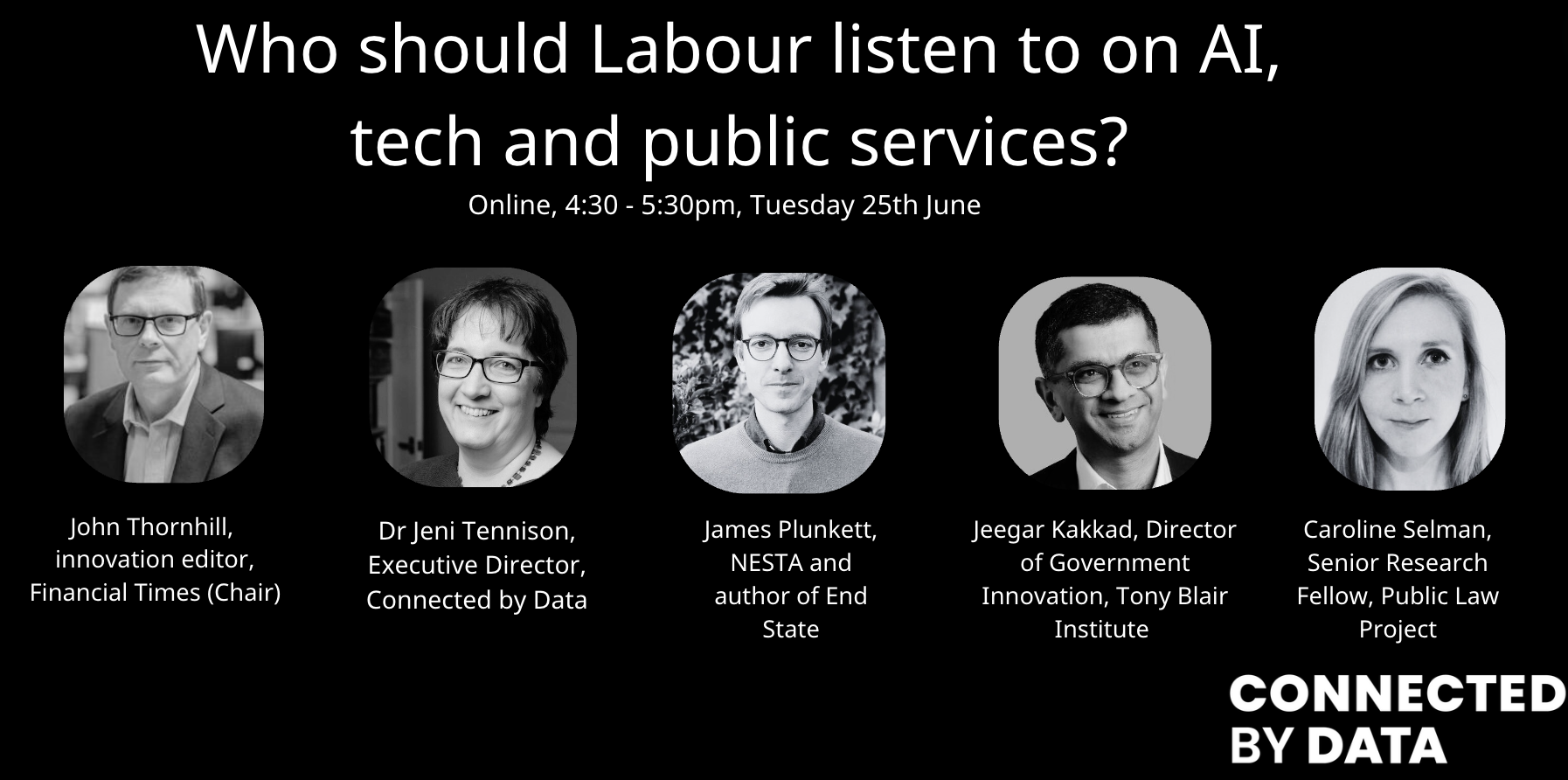
On Tuesday 25 June, Connected by Data hosted a Question Time-style event on a possible Labour government’s approach to data and AI in public services. You can watch recording of the event on our YouTube channel.

Tim presented at a meeting of the Local Government Association’s AI Peer Network on “Giving communities a powerful voice in governing AI”, sharing practical approaches to embed participatory practices in decisions about data and AI at a local level. The meeting also included a presentation from Megan Lawless on the Manchester People’s Panel for AI.
Slides and a transcript of Tim’s presentation are shared below.

On 5th December 2022, CONNECTED BY DATA organised an event in parliament, hosted and chaired by Lord Tim Clement-Jones, to explore three key areas around the future of data governance: automated decision-making, data at work and data in schools.
These are all areas that could be affected by the Data Protection and Digital Information Bill, expected to return to parliament for its second reading at some point in 2023. We think the Bill represents an opportunity to influence how data is governed in a more democratic and participatory way, but worry that – in its present form – it undermines existing safeguards and misses the chance to extend democratic data governance.
The three areas under discussion also represent domains where growing data collection and use could have both significant benefits and harms in the future, regardless of what happens to the Bill. The event invited opening contributions from civil society and academic experts on each topic before opening up to a wider discussion. The experts were on the record unless they requested otherwise, with everyone else being unattributed under the Chatham House Rule.
Jeni spoke on this panel alongside Laura Gilbert, Director of Data Science at No.10 Downing Street; Dr. Hatim Abdulhussein from Health Education England; and Lisa Allen from the Open Data Institute.
In the wake of the pandemic, the government aims to make significant cost savings by reducing the civil service headcount. Technology, it says, can help shoulder the burden of this reduced workforce.
This has put automation in the spotlight. RPA was touted as a way to cut through the admin backlog that piled up during lockdowns, and many public sector bodies put it to good use. But can it really replace a significant proportion of the civil service’s workforce?
This panel will assess the state of play for automation, including RPA and its combination with AI and other process technologies, in the UK public sector, and ask how the public sector can get the most out of the technology.
Opinion
Alongside the Generative AI for Education summit in London yesterday, the DfE updated their ‘Product Safety Expectations’ for EdTech developers, and for schools to consider when deciding which tools are safe to use.
Many of the updates reflect discussions from the GenAI in Education: Have Your Say process - offering a powerful mandate from students for these expectations. Check out what students had to say in the video here https://connectedbydata.org/ai-in-education/ or the full report.
“I want to offer another vision of human compatibility in AI: one that embraces a thick and demanding world of human capacity, social complexity, and local politics in place of the thin, pliable, universalizing world of individual preferences.”
Jacob G. Foster; From Thin to Thick: Toward a Politics of Human-Compatible AI. Public Culture 1 September 2023; 35 (3 (101)): 417–430. doi: https://doi.org/10.1215/08992363-10742593
The distinction between “thick” and “thin” modes of involving communities around (data and) AI is useful. “Thin” involvement skims off surface-level instincts and data from frictionless transactions, while “thick” involvement demands thoughtful, complex, nuanced and stretching engagement. In reality we need both.
A strategic approach to the adoption of AI in the public sector should focus investments in places that will make a difference. Saving money is one of the big priorities for this government, so where should it target AI to realise those ambitions?
Late last year the team at Brickwall (who produced Connected by Data’s intro video) got in touch with us to ask if we might collaborate on a commission from the Local Government Association (LGA) to put together scripts for a series of videos intended to explain artificial intelligence. Drawing on desk research, interviews and a session at UK Gov Camp, we put together a proposed approach based on three sections: introducing AI, AI in Action, and Implementing AI.
I’ve been appointed to an external advisory panel to support the design of the “digital centre” in DSIT (currently a smooched together combination of GDS, CDDO and i.AI). I put out a call on Bluesky for reckons and pointers that has had quite the response, summarised here by Tim Paul but you should go read all the responses. I want to try here to distil some of the topics, questions and opinions around the design of public services, technology support, and what DSIT needs to do as the “digital centre”.
I posted recently about the challenge of adoption of AI by the public sector.
There are two sides to this: how the public sector adopts AI itself, and how the public adopts AI-driven public services.
I’ve posted recently about the challenge of purpose and priorities in the adoption of AI by the public sector. This blog post expands on this to look not at what I think the priorities should be, but about how they should be decided, and that prioritisation method institutionalised given it’s not a one off exercise.
